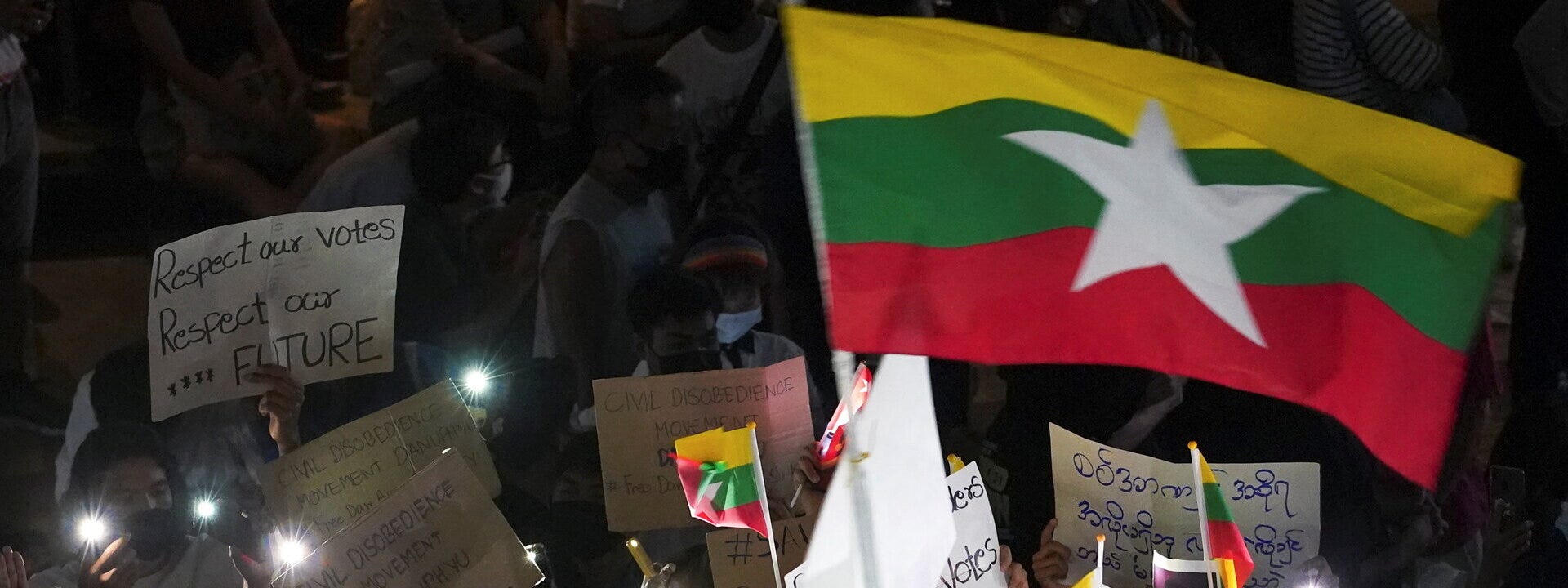How the country’s most precious commodity is being co-opted

The Myanmar military initiated a coup d’état on February 1, 2021 and disrupted access to the internet, making all major communication services mostly unavailable for Myanmar’s 54 million people. Connectivity has largely returned since then, but has come with a warning label: “unrest on social media” will be punished.
This was not the first time this has happened. Since the internet became available in Myanmar in 2000, the government has habitually filtered and controlled internet access. Most infamously, the then-military government shut down the internet during anti-government protests in 2007.
During the Obama administration, the Myanmar government took dramatic steps to remove information turnstiles. Access expanded through aggressive liberalization of the telecommunications market in 2013 when connectivity began pouring into the country. SIM cards flooded the country, offering people the possibility of re-entering the international economy and expanding basic education and health services.
But even then, connectivity could be filtered and managed. Under the National League for Democracy’s civilian government, the Ministry of Transport and Communications initiated the world’s longest internet shutdown in Rakhine and Chin states and blocked media websites. Now, we have seen evidence that the dark reality many have pointed to over the last few years is true: the military has always been in control. Recent events offer clues about how the business of online access fit into this strategy.
Take one example. In August of last year, officials of Ooredoo and Telenor, two major telecommunications companies in Myanmar, faced rumors that they were planning to exit the Myanmar market. The culprit: social media posts claiming they would be pulling out of the country “due to continuous losses.”
The DFRLab later published analysis confirming these posts were part of a network of multiple individual pages and accounts on Facebook linked to Viettel, a telecommunications company owned by Vietnam’s Ministry of Defence, and Mytel, Viettel’s Myanmar subsidiary.
The influence operation deployed a novel tactic. The DFRLab analysis found that misleading pages, promising free data, directed users to dial a code that blocked the user from making calls. Users were then shown a Mytel-branded post on how to “fix” the problem.
Though the $1.2 million influence operation may have impacted more than 265,000 Myanmar consumers, there is to date no evidence that the Myanmar government took any action against Mytel or remediated those affected.
Several months later, a report published by a local activist group, Justice Myanmar, provided evidence suggesting Mytel provides the military with off-budget revenue.
In the same vein, the government last year announced its intention to re-appropriate a universal service fund, raised from corporate income taxes from the nationwide mobile network roll-out, to fund a new biometric SIM card registration system. According to estimates, international analysts projected the fund to collect at least $100 million beginning in 2018.
Civil society leaders have said it is out of line for the government to use funds intended for rural internet access efforts, let alone to support an unaccountable surveillance system without data protection laws in place.
It is now painfully clear that the military’s approach to technology is a microcosm of its larger political strategy: provide a veneer of progress and accountability while maintaining core levers of power to protect its interests. The hard truth is that the military has commandeered new connectivity, once a democratizing force, to serve its political ambitions.
Unmistakably, online access has given civil society and independent media a foothold to leapfrog their work. Since the arrest of the NLD government on February 1st, civil society organizations are tracking efforts to enact new legislation restricting online speech, debunking rumors and helping activists secure their mobile phones. Journalists at online publications such as Frontier Myanmar and Myanmar NOW are providing critical reporting. Gen Z protestors are broadcasting acts of mass civil disobedience on social media with witty taglines, notwithstanding intermittent access. Movement art is spreading online. These are the voices that must be protected and elevated as the international community develops responses to the military takeover.
One wonders now what the next epoch of Myanmar’s internet history will look like. Will Myanmar’s online ecosystem fall in line with others in the region, which allow connectivity to drive commerce, but are heavily managed with authoritarian values? Or will it become even more restricted?
We don’t know with any certainty what the next few weeks or months will bring. Observing how the military approaches the internet and underlying tech infrastructure, however, will signal what direction the country will head in and whether the country’s connectivity revolution will live up to its true promise.
Sarah Oh is a Non-Resident Fellow with the Digital Forensic Research Lab (DFRLab).
Follow along on Twitter for more in-depth analysis from our #DigitalSherlocks.

